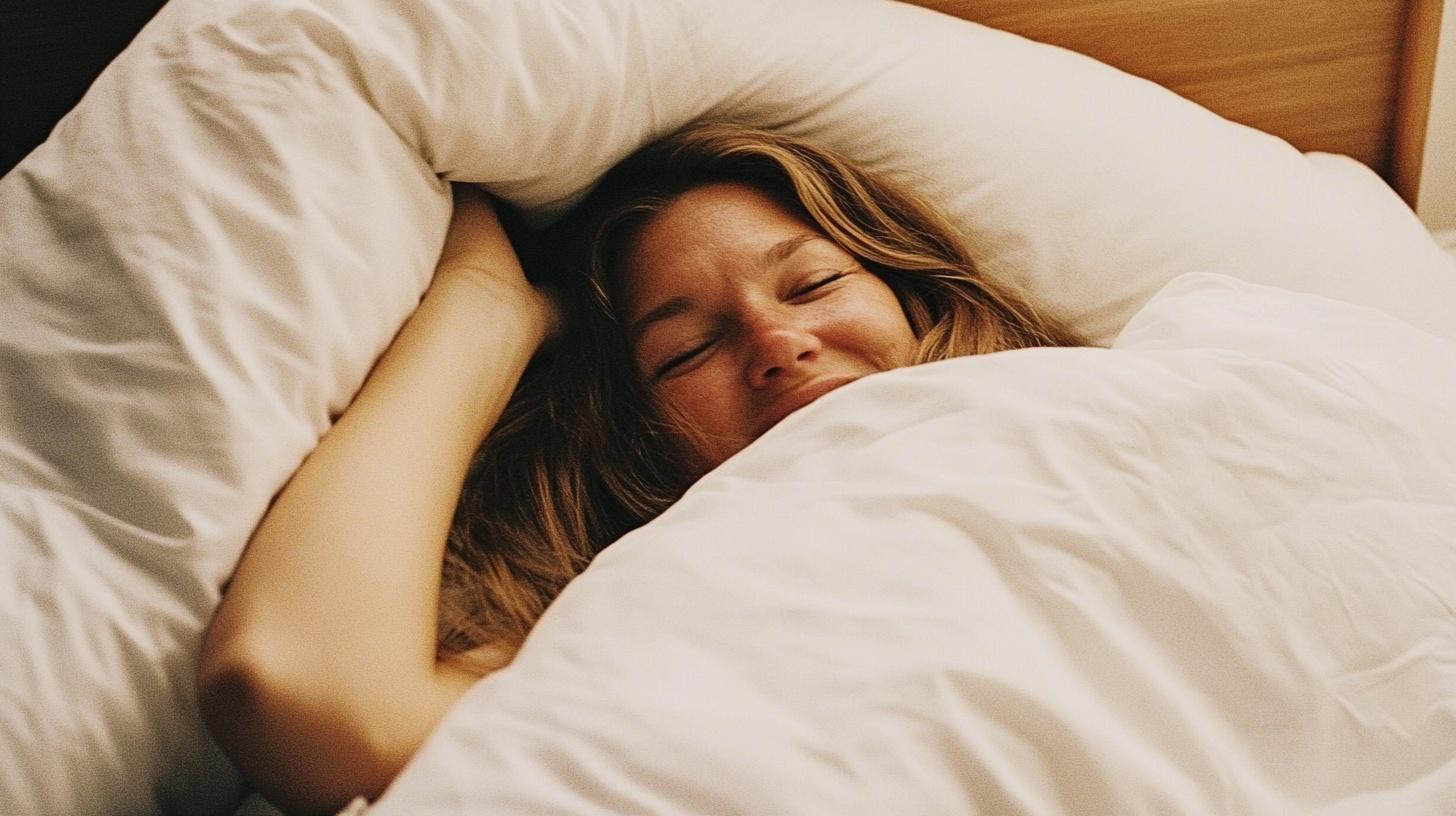The benefits of sleeping with a weighted blanket
Published

Nothing quite compares to snuggling up in bed, curling up under blankets, and letting any tension built-up wash away from you. In recent years, weighted blankets as a means of easing anxiety and promoting a sense of calm, have risen in popularity. The demand for weighted blankets has skyrocketed, growing as more people find that they feel better, and sleep better, when sleeping with them. Let us investigate how being enveloped by a heavy blanket can improve sleep at night and provide benefits for those struggling with a variety of ailments.
What is a weighted blanket?
A weighted blanket is just what the name suggests – a blanket with heavy, weighted filling. The additional weight feels like an embrace as it surrounds your body, creating a sense of security and a feeling of relaxation which makes it easier for us to fall asleep.
These calming blankets can weigh between 2 kg (4.4 lbs) up to 16 kg (35.4 lbs). The additional weight is added by filling it with glass pearls, beads, chains, pellets, pebbles, polyester thread, grains, beans, or even sand.
How to choose a weighted blanket? – Weight chart
General guidelines recommend that blankets should be approximately 10% of your body weight.
| Body Weight | Blanket Weight |
| 30-49 lbs / 14-22 kg | 5 lbs / 2 kg |
| 50-79 lbs / 23-36 kg | 8 lbs / 3.5 kg |
| 80-99 lbs / 37-45 kg | 10 lbs / 4.5 kg |
| 100-119 lbs / 46-54 kg | 12 lbs / 5 kg |
| 120-149 lbs / 55-67 kg | 15 lbs / 7 kg |
| 150-179 lbs / 68-81 kg | 18 lbs / 8 kg |
| 180-199 lbs / 82-90 kg | 20 lbs / 9 kg |
| 200+ lbs / 91+ kg | 25 lbs / 11 kg |
Benefits of weighted blankets
Although the research on the benefits of weighted blankets in sleep is still inconclusive, users state that they experience increased relaxation and reduced stress. Other user-reported potential benefits include:
- Reduced symptoms of restless leg syndrome
- Improved mood
- Increased comfort, since the blanket mimics a hug
- Helps children on the autism spectrum, including those with sensory processing disorder (please see cautionary note below)
- Decreases movement throughout the night, which may help improve overall sleep quality
- Less time to fall asleep – a 2022 study suggested that using a weighted blanket may result in greater release of melatonin, also relieving insomnia.
Regarding the third point, the added weight hugs the body, creating pressure on the skin that relaxes the nervous system. When we feel pressure from a weighted blanket, our bodies tend to experience Deep Pressure Stimulation (DPS). DPS stimulates deep skin receptors, prompting our hormone system to produce and release feel-good hormones such as oxytocin. Oxytocin is primarily linked to relaxation and the relief of stress and anxiety, which can also help us fall asleep faster and contribute to improved sleep quality.
Are weighted blankets safe?
As a general rule, weighted blankets are safe for healthy adults, older children, and teenagers. Weighted blankets should not be used for toddlers under the age two, as they may pose a suffocation risk. Even older children with developmental disabilities may be at risk of suffocation. Parents considering using a weighted blanket should therefore always consult their pediatrician before using one for children of any age. Young children should never be left unsupervised with a weighted blanket, particularly those made for an adult.
People with certain health conditions may also need to avoid weighted blankets or first consult their healthcare provider. For example:
- Chronic respiratory conditions, such as asthma, chronic obstructive pulmonary disease (COPD), and obstructive sleep apnea.
- Diabetes
- Circulation or blood pressure issues
- Fragile skin
- Body temperature issues
- Chronic pain
- Menopause
In certain cases, the blanket may also trigger feelings of claustrophobia. If you are unsure, always consult a physician.
Can you use a weighted blanket while pregnant?
There’s not enough evidence to fully say whether weighted blankets are safe and beneficial for pregnant women. In most cases, they don’t pose a serious risk to pregnancy but like with any health-related decision, it’s important to first consult with a doctor before using one.
Remember that the best way to sleep while pregnant is sleeping on your side, especially from 28 weeks, as it helps promote blood flow to the baby.
Do weighted blankets work? – Scientific research is ongoing
As said, given that the global popularity of the weighted blanket is relatively new, scientific research on its benefits is still underway. Recent research and scientific studies have confirmed what most users experience firsthand: that it makes people relax and gives them a perceived feeling of better sleep (which doesn’t mean that it is fully proven that weighted blankets improve sleep).
A recently published scientific study by Karolinska Institutet in Huddinge, Sweden, was one of the first placebo-controlled studies in the field. The researchers concluded that chain blankets, a type of weighted blanket, are a safe and effective intervention for insomnia in patients with mental conditions, such as severe depression, bipolar disorder, generalized anxiety disorder and hyperactivity disorder, ADHD. Following up a year after the study, the patients who continued to sleep with a weighted blanket experienced a continued positive effect on their sleep quality. Results showed that patients had:
- Higher activity levels during the day
- Reduced fatigue, depression and anxiety
Try it yourself
Today, the market for weighted blankets has rapidly expanded around the world, with new products and related innovations being released all the time. As more people learn about the potential benefits and begin to use weighted duvets, it may stimulate and promote better sleep hygiene and the many benefits that improved sleep quality generates. Why weight?






